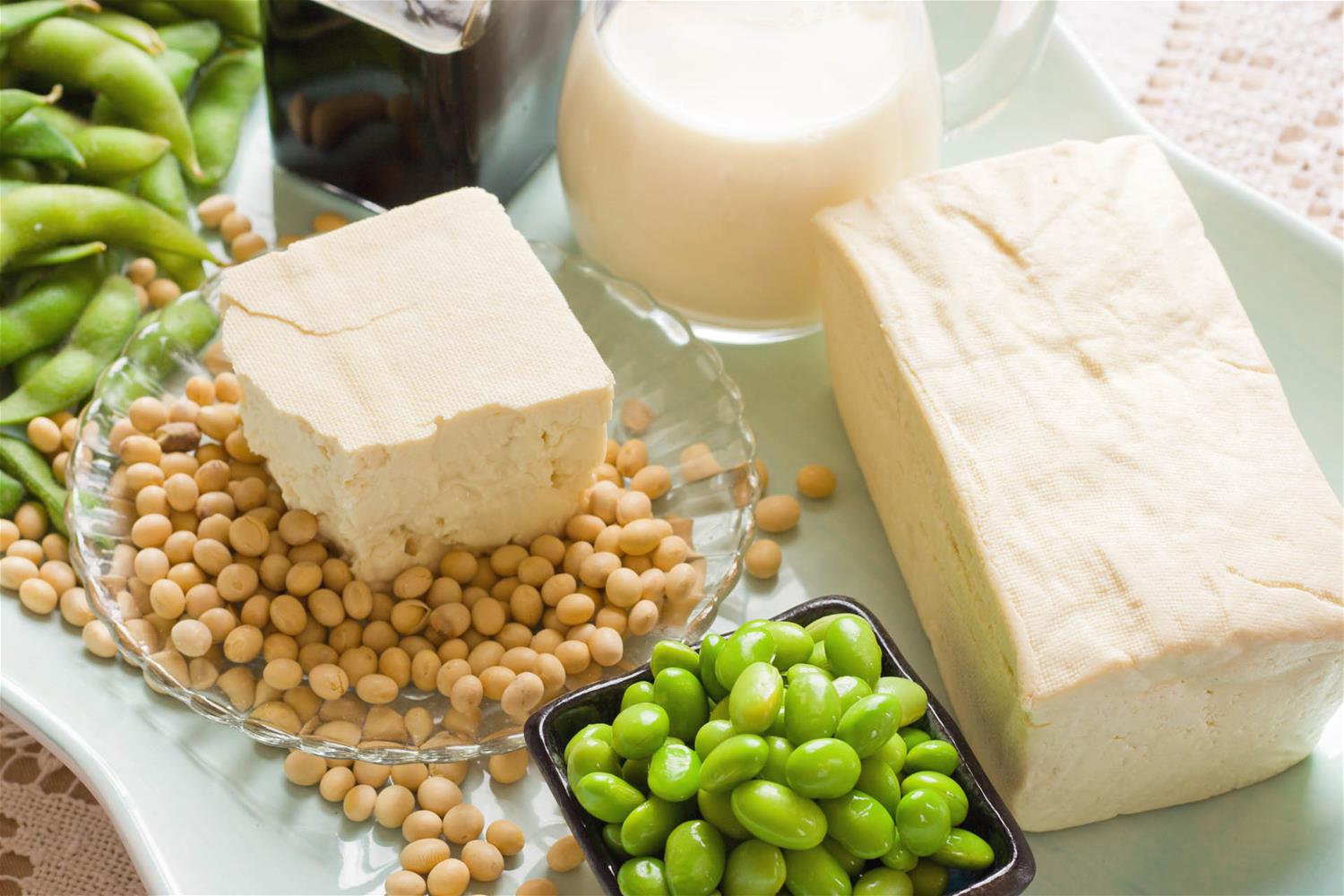Soy Nutrition and
Health Research
Research shows that soy is linked to many health benefits. Educate yourself with the latest research on soy nutrition pertaining to women’s health, men’s health and children’s health.
Discover the latest soy nutrition research
and download free fact sheets on a variety
of health topics.
Click Below to Learn More

Women’s Health
Soyfoods hold special appeal for postmenopausal women because they are uniquely rich sources of isoflavones.1 Isoflavones are classified as phytoestrogens, although they differ from the hormone estrogen at the molecular and clinical levels.2 Clinical work shows isoflavones alleviate hot flash frequency and severity significantly more than a placebo.3 Isoflavones also improve endothelial function, thereby helping reduce the risk of coronary heart disease. 4 Intriguing evidence indicates that isoflavones can improve skin health as well, including reducing wrinkles.5 Although clinical studies evaluating the skeletal benefits have produced mixed results, at the very least, many soyfoods are good sources of calcium and vitamin D. Additionally, research shows that breast cancer survivors can safely consume soyfoods and their prognosis may actually be improved by doing so.6 Download Soy Connection’s Soy & Women’s Health brochure to learn more.
Men’s Health
Soyfoods provide high-quality protein to help meet dietary needs, and soy protein modestly lowers blood cholesterol levels. Soy protein content also leads to gains in muscle mass and strength in men undergoing resistance exercise training to a similar extent as whey protein. Observational data shows that soy intake is associated with a reduced risk of developing prostate cancer as well. Although soyfoods contain isoflavones, which are classified as phytoestrogens, evidence shows that soy does not feminize men. In clinical studies, soy does not lower circulating levels of testosterone, raise estrogen levels or adversely affect sperm or semen metrics. Explore our Soy & Men’s Health Hub or download the Soy & Men’s Health brochure to learn more.

RESOURCES:

Children’s Health
Soyfoods are nutritious additions to children’s diets. They provide good soy protein content with lower levels of saturated fat typically present in other commonly consumed sources of protein.1 In fact, studies show children find soyfoods as acceptable as their non-soy counterparts.2-4 Furthermore, as in adults, soy protein lowers blood cholesterol levels in children.5-9 Intriguing evidence also indicates that consuming just one serving of soy during childhood and/or adolescence markedly reduces breast cancer risk later in life.2-4 Concerns that soyfoods might adversely affect development are contradicted by studies showing that soy does not affect menses onset in girls10 and puberty onset for boys who consume high amounts of soy falls well within the normal age range.11 Download Soy Connection’s Soy & Children’s Health brochure to learn more.
DOWNLOADS:
Myths & Facts
Soyfoods have been the subject of considerable misinformation and even disinformation. Many myths exist about the health effects of soyfoods. For example, extensive clinical data shows soyfoods do not feminize men, as is sometimes claimed.1,2 Concerns that soyfoods are harmful to breast cancer survivors are contrary to the positions of the American Cancer Society,3 American Institute for Cancer Research4, and the World Cancer Research Fund.5 Clinical studies have also shown that soy does not cause thyroid problems,6 a conclusion recently reached by the European Food Safety Authority.7 Even discussions about the prevalence of soy allergy are often misinformed. Approximately one out of every 1,000 adults is allergic to soy protein, which is much less than the prevalence of milk and peanut allergies.8 Download Soy Connection’s Soy Myths & Facts brochure and visit the Soy Myths & Facts page to learn more.


Heart Health
Soyfoods may reduce the risk of coronary heart disease through multiple mechanisms. Soy protein directly lowers blood cholesterol levels, an effect formally recognized by the FDA.1 The soybean is also predominately made up of polyunsaturated fat, providing ample amounts of both essential fatty acids: the omega-6 fatty acid, linoleic acid, and omega-3 fatty acid, alpha-linolenic acid.2 When soyfoods replace common sources of protein in the U.S. diet, blood cholesterol levels are further reduced because of the beneficial change in fatty acid intake.3 Unsaturated fat also favorably affects other processes to further reduce the cause of coronary heart disease such as cholesterol efflux capacity.4 Finally, the isoflavones in soybeans improve endothelial function5,6 and reduce arterial stiffness.7 Soyfoods warrant inclusion in heart healthy diets. Download Soy Connection’s Soy & Heart Health brochure to learn more.
Breast Cancer
Observational studies in the Asia-Pacific region show soyfood intake is associated with a reduction in breast cancer risk.1 However, several lines of evidence support the hypothesis that consumption must occur early in life for soy to reduce risk. In fact, epidemiologic studies have found that consuming approximately one serving per day of a soyfood during childhood and/or adolescence reduces risk by as much as 60 percent.2 Concerns that soyfoods are contraindicated for breast cancer survivors are based on studies in rodents and are not supported by research involving both healthy women and women with breast cancer. Clinical studies show that even large amounts of soy do not adversely affect markers of breast cancer risk, including mammographic density3 and breast cell proliferation.4-9 Furthermore, prospective epidemiologic studies involving over 11,000 breast cancer survivors show that post-diagnosis soy intake is associated with a statistically significant reduction in recurrence and mortality.10 Explore Soy Connection's Soy & Breast Cancer Health resources to learn more.

RESOURCES:
Earn continuing education credits. Find dietician approved recipes. Learn more about soy, including consumer insights, sustainable farming practices, and soy’s FDA heart health claims.
Soy & Women's Health
- Franke AA, Custer LJ, Wang W, et al. HPLC analysis of isoflavonoids and other phenolic agents from foods and from human fluids. Proc Soc Exp Biol Med. 1998;217(3):263-73.
- Oseni T, Patel R, Pyle J, et al. Selective estrogen receptor modulators and phytoestrogens. Planta Med. 2008;74(13):1656-65.
- Taku K, Melby MK, Kronenberg F, et al. Extracted or synthesized soybean isoflavones reduce menopausal hot flash frequency and severity: systematic review and meta-analysis of randomized controlled trials. Menopause. 2012;19(7):776-90.
- Li SH, Liu XX, Bai YY, et al. Effect of oral isoflavone supplementation on vascular endothelial function in postmenopausal women: a meta-analysis of randomized placebo-controlled trials. Am J Clin Nutr. 2010;91(2):480-6.
- Jenkins G, Wainwright LJ, Holland R, et al. Wrinkle reduction in post-menopausal women consuming a novel oral supplement: a double-blind placebo-controlled randomized study. Int J Cosmet Sci. 2014;36(1):22-31.
- Chi F, Wu R, Zeng YC, et al. Post-diagnosis soy food intake and breast cancer survival: A meta-analysis of cohort studies. Asian Pacific journal of cancer prevention : APJCP. 2013;14(4):2407-12.
Soy & Men's Health
- Hughes GJ, Ryan DJ, Mukherjea R, et al. Protein digestibility-corrected amino acid scores (PDCAAS) for soy protein isolates and concentrate: Criteria for evaluation. J Agric Food Chem. 2011;59(23):12707-12.
- Jenkins DJ, Mirrahimi A, Srichaikul K, et al. Soy protein reduces serum cholesterol by both intrinsic and food displacement mechanisms. J Nutr. 2010;140(12):2302S-11S.
- Messina M, Lynch H, Dickinson JM, et al. No difference between the effects of supplementing with soy protein versus animal protein on gains in muscle mass and strength in response to resistance exercise. International journal of sport nutrition and exercise metabolism. 20181-36.
- Applegate CC, Rowles JL, Ranard KM, et al. Soy consumption and the risk of prostate cancer: An updated systematic review and meta-analysis. Nutrients. 2018;10(1).
- Hamilton-Reeves JM, Vazquez G, Duval SJ, et al. Clinical studies show no effects of soy protein or isoflavones on reproductive hormones in men: results of a meta-analysis. Fertil Steril. 2010;94(3):997-1007.
- Messina M. Soybean isoflavone exposure does not have feminizing effects on men: a critical examination of the clinical evidence. Fertil Steril. 2010;93(7):2095-104.
- Mitchell JH, Cawood E, Kinniburgh D, et al. Effect of a phytoestrogen food supplement on reproductive health in normal males. Clin Sci (Lond). 2001;100(6):613-8.
- Beaton LK, McVeigh BL, Dillingham BL, et al. Soy protein isolates of varying isoflavone content do not adversely affect semen quality in healthy young men. Fertil Steril. 2010;94(5):1717-22.
Soy & Children's Health
- Hughes GJ, Ryan DJ, Mukherjea R, et al. Protein digestibility-corrected amino acid scores (PDCAAS) for soy protein isolates and concentrate: Criteria for evaluation. J Agric Food Chem. 2011;59(23):12707-12.
- Endres J, Barter S, Theodora P, et al. Soy-enhanced lunch acceptance by preschoolers. J Am Diet Assoc. 2003;103(3):346-51.
- Ashraf HR, Schoeppel C, Nelson JA. Use of tofu in preschool meals. J Am Diet Assoc. 1990;90(8):1114-6.
- Reilly JK, Lanou AJ, Barnard ND, et al. Acceptability of soymilk as a calcium-rich beverage in elementary school children. J Am Diet Assoc. 2006;106(4):590-3.
- Laurin D, Jacques H, Moorjani S, et al. Effects of a soy-protein beverage on plasma lipoproteins in children with familial hypercholesterolemia. Am J Clin Nutr. 1991;54(1):98-103.
- Widhalm K, Brazda G, Schneider B, et al. Effect of soy protein diet versus standard low fat, low cholesterol diet on lipid and lipoprotein levels in children with familial or polygenic hypercholesterolemia. J Pediatr. 1993;123(1):30-4.
- Gaddi A, Descovich GC, Noseda G, et al. Hypercholesterolaemia treated by soybean protein diet. Arch Dis Child. 1987;62(3):274-8.
- Blumenschein S, Torres E, Kushmaul E, et al. Effect of oat bran/soy protein in hypercholesterolemic children. Ann N Y Acad Sci. 1991;623413-5.
- Weghuber D, Widhalm K. Effect of 3-month treatment of children and adolescents with familial and polygenic hypercholesterolaemia with a soya-substituted diet. Br J Nutr. 2008;99(2):281-6.
- Segovia-Siapco G, Pribis P, Messina M, et al. Is soy intake related to age at onset of menarche? A cross-sectional study among adolescents with a wide range of soy food consumption. Nutrition journal. 2014;13(1):54.
- Segovia-Siapco G, Pribis P, Oda K, et al. Soy isoflavone consumption and age at pubarche in adolescent males. Eur J Nutr. 2017.
Soy Myths & Facts
- Hamilton-Reeves JM, Vazquez G, Duval SJ, et al. Clinical studies show no effects of soy protein or isoflavones on reproductive hormones in men: results of a meta-analysis. Fertil Steril. 2010;94(3):997-1007.
- Messina M. Soybean isoflavone exposure does not have feminizing effects on men: a critical examination of the clinical evidence. Fertil Steril. 2010;93(7):2095-104.
- Rock CL, Doyle C, Demark-Wahnefried W, et al. Nutrition and physical activity guidelines for cancer survivors. CA Cancer J Clin. 2012;62(4):242-74.
- American Institute for Cancer Research. Soy is safe for breast cancer survivors. http://wwwaicrorg/cancer-research-update/november_21_2012/cru-soy-safehtml (accessed Feburary 5, 2013). 2012.
- American Institute for Cancer Research, World Cancer Research Fund. Diet, nutrition, physical activity and breast cancer survivors. Updated 2018. Continuous update project (http://www.aicr.org/continuous-update-project/breast-cancer.html). Accessed July 14, 2018.
- Messina M, Redmond G. Effects of soy protein and soybean isoflavones on thyroid function in healthy adults and hypothyroid patients: a review of the relevant literature. Thyroid. 2006;16(3):249-58.
- EFSA ANS Panel (EFSA Panel on Food Additives and Nutrient Sources added to Food), 2015. Scientific opinion on the risk assessment for peri- and post-menopausal women taking food supplements containing isolated isoflavones. EFSA J. 2015;13(10):4246 (342 pp).
- Verrill L, Bruns R, Luccioli S. Prevalence of self-reported food allergy in U.S. adults: 2001, 2006, and 2010. Allergy Asthma Proc. 2015;36(6):458-67.
Soy & Heart Health
- Food Labeling: Health Claims; Soy Protein and Coronary Heart Disease. In: Federal Register: (Volume 64, Number 206)]; 1999:57699-733.
- Slavin M, Kenworthy W, Yu LL. Antioxidant properties, phytochemical composition, and antiproliferative activity of Maryland-grown soybeans with colored seed coats. J Agric Food Chem. 2009;57(23):11174-85.
- Jenkins DJ, Mirrahimi A, Srichaikul K, et al. Soy protein reduces serum cholesterol by both intrinsic and food displacement mechanisms. J Nutr. 2010;140(12):2302S-11S.
- Liu X, Garban J, Jones PJ, et al. Diets low in saturated fat with different unsaturated fatty acid profiles similarly increase serum-mediated cholesterol efflux from thp 1 macrophages in a population with or at risk for metabolic syndrome: the canola oil multicenter intervention trial J Nutr. 2018;148721-8.
- Li SH, Liu XX, Bai YY, et al. Effect of oral isoflavone supplementation on vascular endothelial function in postmenopausal women: a meta-analysis of randomized placebo-controlled trials. Am J Clin Nutr. 2010;91(2):480-6.
- Beavers DP, Beavers KM, Miller M, et al. Exposure to isoflavone-containing soy products and endothelial function: A Bayesian meta-analysis of randomized controlled trials. Nutrition, metabolism, and cardiovascular diseases : NMCD. 2012;22(3):182-91.
- Pase MP, Grima NA, Sarris J. The effects of dietary and nutrient interventions on arterial stiffness: a systematic review. Am J Clin Nutr. 2011;93(2):446-54.
Soy & Breast Cancer Health
- Xie Q, Chen ML, Qin Y, et al. Isoflavone consumption and risk of breast cancer: a dose-response meta-analysis of observational studies. Asia Pacific journal of clinical nutrition. 2013;22(1):118-27.
- Korde LA, Wu AH, Fears T, et al. Childhood soy intake and breast cancer risk in Asian American women. Cancer Epidemiol Biomarkers Prev. 2009;18(4):1050-9.
- Hooper L, Madhavan G, Tice JA, et al. Effects of isoflavones on breast density in pre- and post-menopausal women: a systematic review and meta-analysis of randomized controlled trials. Hum Reprod Update. 2010;16(6):745-60.
- Hargreaves DF, Potten CS, Harding C, et al. Two-week dietary soy supplementation has an estrogenic effect on normal premenopausal breast. J Clin Endocrinol Metab. 1999;84(11):4017-24.
- Sartippour MR, Rao JY, Apple S, et al. A pilot clinical study of short-term isoflavone supplements in breast cancer patients. Nutr Cancer. 2004;49(1):59-65.
- Palomares MR, Hopper L, Goldstein L, et al. Effect of soy isoflavones on breast proliferation in postmenopausal breast cancer survivors. Breast Cancer Res Treatment. 2004;88 (Suppl 1)4002 (Abstract).
- Cheng G, Wilczek B, Warner M, et al. Isoflavone treatment for acute menopausal symptoms. Menopause. 2007;14(3 Pt 1):468-73.
- Khan SA, Chatterton RT, Michel N, et al. Soy isoflavone supplementation for breast cancer risk reduction: A randomized phase II trial. Cancer Prev Res (Phila). 2012;5(2):309-19.
- Shike M, Doane AS, Russo L, et al. The effects of soy supplementation on gene expression in breast cancer: a randomized placebo-controlled study. J Natl Cancer Inst. 2014;106(9).
- Chi F, Wu R, Zeng YC, Xing R, Liu Y, Xu ZG. Post-diagnosis soy food intake and breast cancer survival: A metaanalysis of cohort studies. Asian Pac J Cancer Prev 2013;14:2407-12.


